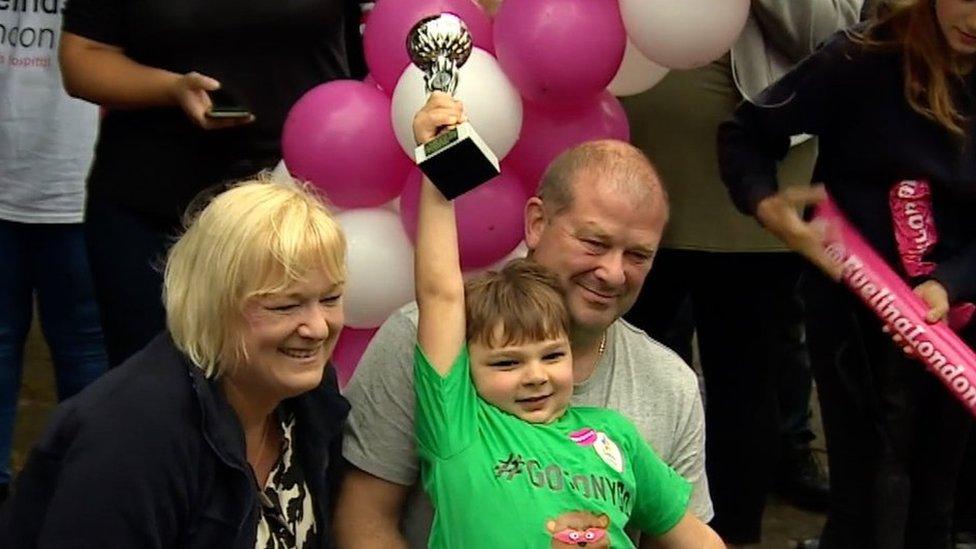NSPCC says child cruelty offences rose by a quarter in a year
- Published

Paula Hudgell (l), with adopted son Tony, says everyone needs to play their part in keeping children safe
The number of child cruelty offences in England jumped by a quarter last year, according to police data collected by the NSPCC.
The child protection charity blames the stress many families felt during the pandemic for the rise, and backs recent high-profile calls for earlier help.
"This must be a priority for government," said NSPCC chief executive Sir Peter Wanless.
Ministers have promised "a fundamental shift" in help for struggling families.
The NSPCC sent Freedom of Information requests to each of England's 39 police forces and 36 responded.
Thousands more cases
There were more than 26,000 offences recorded where a child suffered neglect or cruelty in the year to the end of March 2022, up from just over 21,000 the year before, the figures suggest.
This amounts to an average of 72 cases of child neglect or cruelty each day, the charity calculates.
Some of the increase may be down to better awareness and recording by police, but the charity says the findings are worrying.
It says communities have an important role to play and wants anyone who is concerned about a child to contact the NSPCC or the authorities.
And it is also calling for more help to be available to families before they reach crisis point.
Last month, a major review echoed those calls and concluded that council-run child protection services in England needed to shift from crisis intervention to providing more early support to struggling families.
The review, led by Josh MacAlister called for £2.6bn over five years to transform the system and prevent the number of children in care - already at record levels - rising above 100,000.
A separate report into the deaths of toddlers Arthur Labinjo-Hughes and Star Hobson, both murdered by their parents' partners in 2020, said concerns of their wider families were too often "disregarded" by professionals.
The NSPCC hopes the new data will "reinforce to government, the need for fundamental changes to the child protection system".
'Everyone can help'
"But our message isn't just for politicians. It's vital to remember that child abuse can be prevented," said Sir Peter.
The figures are being released on the charity's flagship Childhood Day, to help raise awareness of "how everyone can play their part in keeping children safe".
"We play our part in many ways," said campaigner Paula Hudgell, from Kent. Her adopted son Tony had both his legs broken as a six-month-old baby by his biological parents, who also failed to get help for him for several days.
"We have witnessed first-hand the devastating effect of child cruelty and neglect, and hope no child ever experiences what Tony went through. However, this won't be made possible without government leading the way and reforming the children's social care system," said Paula.
A government official said: "Every child deserves to be safe, happy, and loved.
"We have already improved how safeguarding agencies work together locally, putting a shared and equal duty on police, councils and health in local areas to work together to safeguard and promote the welfare of children.
"Following the review into the tragic deaths of Arthur Labinjo-Hughes and Star Hobson, we also announced the launch of a new child protection ministerial group that will champion safeguarding at highest levels of government.
"We will set out an ambitious action plan later this year aimed at bringing about a fundamental shift in how we support the most vulnerable children and families."